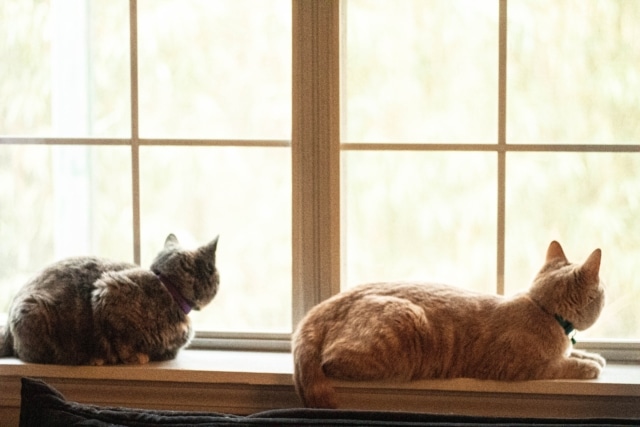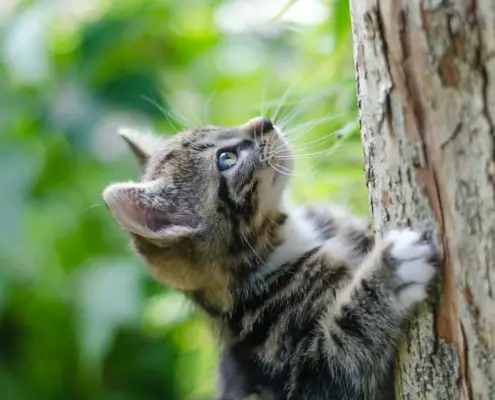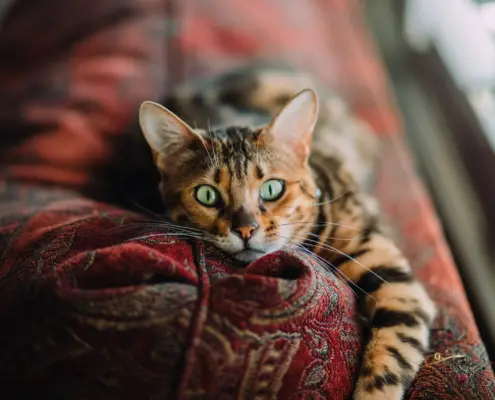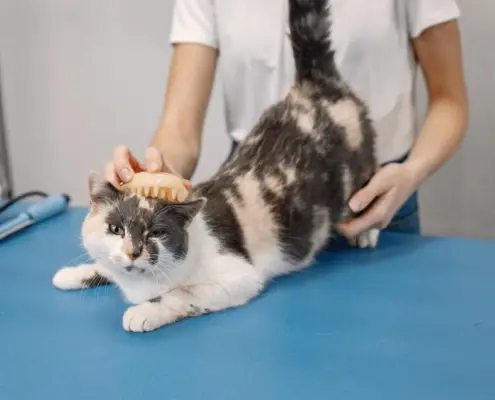
As cats age, their bodies undergo various changes that require special attention and care. Understanding the aging process is crucial for providing the best possible care for your senior cat. Cats are considered seniors when they reach around 7-10 years of age, depending on their breed and overall health.
One of the most noticeable changes in senior cats is a decrease in their activity level. They may sleep more and become less interested in playing or exploring. This is normal and can be attributed to age-related changes in their metabolism and energy levels. Additionally, you may notice changes in their coat, such as graying or thinning, which is also a natural part of the aging process.
Signs of Aging in Senior Cats
Recognizing the signs of aging in senior cats is essential for detecting any potential health issues early on. Some common signs include weight loss, decreased appetite, increased thirst, changes in litter box habits, and decreased mobility. If you notice any of these changes in your senior cat, it is important to consult with your veterinarian to rule out any underlying health conditions.
Another sign of aging in senior cats is a decline in their sensory functions. They may experience reduced hearing or vision, which can affect their overall well-being. Providing a safe and comfortable environment for your senior cat becomes crucial, ensuring they have easy access to their litter box, food, and water, and minimizing any potential hazards.
Common Health Issues in Senior Cats
Senior cats are more prone to certain health issues, and being aware of them can help you take preventive measures and seek timely veterinary care. Some common health problems in senior cats include dental disease, arthritis, kidney disease, hyperthyroidism, and diabetes. Regular veterinary check-ups and screenings can help detect these conditions early on, increasing the chances of successful treatment.
Dental disease is particularly common in senior cats and can lead to pain, difficulty eating, and other health complications. Regular dental care, including brushing their teeth and providing dental treats or toys, can help maintain their oral health. Arthritis, which causes joint inflammation and stiffness, can be managed through pain medication, dietary supplements, and providing comfortable resting areas.
Nutrition for Senior Cats
Proper nutrition plays a vital role in promoting the overall health and well-being of senior cats. As cats age, their dietary needs change, and it is important to provide them with a balanced diet tailored to their specific requirements. Senior cat food formulas are available commercially and are specifically designed to meet the nutritional needs of older cats.
Senior cat food is typically lower in calories and contains higher levels of protein to support muscle maintenance. It may also include supplements such as omega-3 fatty acids and antioxidants to promote joint health and boost the immune system. Consult with your veterinarian to determine the best diet for your senior cat based on their individual needs and any existing health conditions.
Exercise and Mental Stimulation for Senior Cats
Although senior cats may be less active than their younger counterparts, regular exercise and mental stimulation are still important for maintaining their physical and mental well-being. Engaging your senior cat in gentle play sessions using interactive toys can help keep them physically active and mentally stimulated.
Providing scratching posts, climbing trees, and vertical spaces can help your senior cat exercise their muscles and maintain their flexibility. Puzzle toys and treat-dispensing toys can also provide mental stimulation and keep their minds sharp. It is essential to tailor the exercise routine to your cat’s abilities and preferences, ensuring they are not overexerted or stressed.
Environmental Modifications for Senior Cats
Modifying your home environment to accommodate the changing needs of your senior cat can greatly enhance their quality of life. Senior cats may find it more challenging to jump onto high surfaces or access certain areas of the house. Providing ramps or steps can assist them in reaching their favorite spots comfortably.
Ensuring that litter boxes have low sides or offering a litter box with an entrance cutout can make it easier for senior cats to use them. Placing litter boxes on each floor of the house can also prevent accidents if your senior cat has difficulty reaching them in time. Additionally, placing food and water bowls at a convenient height can prevent strain on their joints and neck.
Regular Veterinary Care for Senior Cats
Regular veterinary care is crucial for maintaining the health and well-being of senior cats. As cats age, they are more susceptible to various health conditions and may require more frequent check-ups. Your veterinarian can perform comprehensive examinations, including bloodwork and screenings, to detect any potential health issues early on.
Vaccinations should be kept up to date to protect your senior cat from preventable diseases. Dental cleanings may be necessary to address dental disease and maintain oral health. Regular parasite prevention, such as flea and tick control, is also important to keep your senior cat comfortable and healthy. Establishing a good relationship with your veterinarian and following their recommendations can help ensure your senior cat receives the best possible care.
Providing Emotional Support for Senior Cats
Senior cats may experience changes in behavior or mood as they age, and providing emotional support is essential for their well-being. They may become more clingy or anxious, and it is important to offer them comfort and reassurance. Spending quality time with your senior cat, providing gentle affection, and maintaining a consistent daily routine can help alleviate their anxiety and stress.
Creating a calm and quiet environment is also beneficial for senior cats, especially if they experience sensory issues. Providing cozy hiding spots, soft bedding, and minimizing loud noises can help them feel safe and secure. Additionally, consider introducing environmental enrichment activities, such as puzzle toys or window perches, to provide mental stimulation and prevent boredom.
Making the End of Life Decisions for Senior Cats
As much as we hope our senior cats live long and healthy lives, there may come a time when difficult end-of-life decisions need to be made. It is important to consider the quality of life of your senior cat and consult with your veterinarian to assess their overall well-being. Your veterinarian can guide you through the decision-making process and provide support during this challenging time.
When the time comes, euthanasia can be a compassionate option to prevent further suffering in your senior cat. Your veterinarian can explain the procedure and ensure that your cat’s final moments are peaceful and pain-free. Remember to give yourself time to grieve and seek support from friends, family, or support groups who understand the unique bond between humans and their senior cats.
Embracing and Cherishing Your Senior Cat
Caring for a senior cat is a rewarding experience that requires patience, love, and understanding. By understanding the aging process, recognizing the signs of aging, and providing the necessary care, you can ensure that your senior cat lives a comfortable and fulfilling life. Embrace the changes that come with age and cherish the precious moments you have with your senior cat. With proper care and attention, your senior cat can age gracefully and continue to bring joy to your life for years to come.
If you have a senior cat, start implementing the tips mentioned in this article to ensure they receive the best possible care. Remember, every moment with your senior cat is precious, so make the most of it!
If you enjoyed my article, I would appreciate you sharing it with your network.

Sima Ndlebe
Sima writes for CatBuzz. He is interested in Cats, Health and Fitness, and Entrepreneurship.
Published: 13 October 2023
Related Articles
Disclaimer
The content found on CatBuzz.org is presented on an "as is" basis and is intended for general consumer information and education purposes only. Any utilization of this information is voluntary and solely at the user's own risk.
None of the articles or content should be regarded as, or used in place of, veterinary medical advice, diagnosis, or treatment. The information provided on the website is purely for educational and informational intentions and should not be considered a substitute for professional guidance from a veterinarian or other qualified expert. The articles are designed to inform consumers about veterinary healthcare and medical matters that may impact their cat's daily life. It should be noted that this website and its services do not constitute the practice of any form of veterinary medical advice, diagnosis, or treatment. CatBuzz.org explicitly disclaims any liability for any direct or indirect damages or losses that may arise from the use of or reliance on the information contained within the content.
Consumers must consult a veterinarian, veterinary specialist, or another qualified veterinary healthcare provider when seeking advice regarding their cat's health or medical conditions. It is important not to ignore, avoid, or postpone seeking medical advice from a veterinarian or other qualified veterinary healthcare provider solely based on information obtained from this website. If you believe that your cat may be experiencing a medical issue or condition, it is imperative to promptly contact a qualified veterinary healthcare professional.



